#Max Robinson
Explore tagged Tumblr posts
Text
I am not a wretch, though. Women who look different aren't ruined women. To see ourselves as ruined on the basis of how testosterone and surgery changed our bodies is to reveal the extent to which we hold ourselves to woman-hating definitions of what femaleness is. Being a woman does not mean I exist to be looked at and have my appearance evaluated, and it does not mean I have to exist to have children. These are the metrics by which transition is considered to have ruined us.
- Max Robinson, Detransition: Beyond Before and After, p. 41
#as a woman with pcos i relate a lot#except with surgeries#but yes these are also how pcos is considered to have ruined women#and personally i am often velieved to have been at least some months on t since im butch+pcos broad and hairy#detransition#detrans#max robinson#quotes#badgertalk
346 notes
·
View notes
Text

Max Robinson, the first Black American anchor to co-host a national news network show (ABC World News Tonight) in a photo from 1978
26 notes
·
View notes
Text

78 notes
·
View notes
Note
How does radical feminism explain dysphoria? I agree with the basis of 'if the only reason you think you're trans stems from being treated badly as a girl, feeling unsafe and thinking it'd be easier to be a guy' etc, that's probably not a gender thing, that's just being aware of unequality. But what about stuff like dysphoria that is separate from that? I also have never really met anyone who cited those reasons for figuring out they were trans, I feel like I only see it from rad fem blogs talking about it.
This answer is going to be a bit of a mixed bag, clip compilation of videos and reading, because your question sparked like five different responses and reactions in my head haha. (Great question anon.)
So, different types of diagnoses are different, you can have a disease (caused by a single biological thing, like cancer which is caused by uncontrolled cell growth, or AIDS which is caused by a virus) or you can have a disorder which is characterised by a list of symptoms.
Here is the diagnostic criteria for gender dysphoria in children :
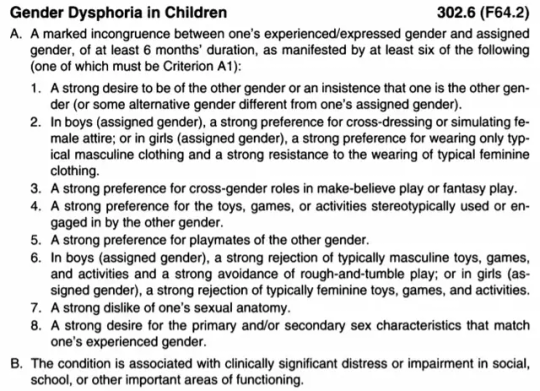
I would have met 4-5 of those as a kid. If i had hated my sexed body, i could have qualified for a dysphoria diagnosis. So that's one criticism of the diagnostic criteria, it leaves open the possibility that quite standard gender nonconformity combined with distress over puberty is diagnosed as dysphoria. So is dysphoria completely separate from sexism or being treated worse as a girl? By the criteria themselves, not really.
Here's a video with more discussion about the criteria:
youtube
We don't know what causes dysphoria, or if it is one thing. We don't know if distressed teenager who meets these criteria is going through the same thing as a little boy being coached to understand his gender nonconformity as being in the wrong body, like the child described in this clip (the woman speaking is Johanna Olson-Kennedy, who is Medical Director of the Center for Trans Youth Health and Development at Children’s Hospital Los Angeles):
dailymotion
Feminist analysis about dysphoria is relatively new, but some women connect it to feminist discussion about anorexia, the plastic surgery industry and anti-psychiatry. You can start out with this article by Victoria Smith and the books she mentions (may be paywalled, archive link here):
Here is an interesting video by a detrans woman about girls growing up in toxic online communities:
youtube
Also no compilation like this would be complete without mentioning the book Detransition: Beyond Before and After by Max Robinson. It may be hard to get a physical copy but there is an audiobook or ebook option too.
8 notes
·
View notes
Text















youtube
1981.
Newscaster Max Robinson denounced ABC News as racist.
26 notes
·
View notes
Text
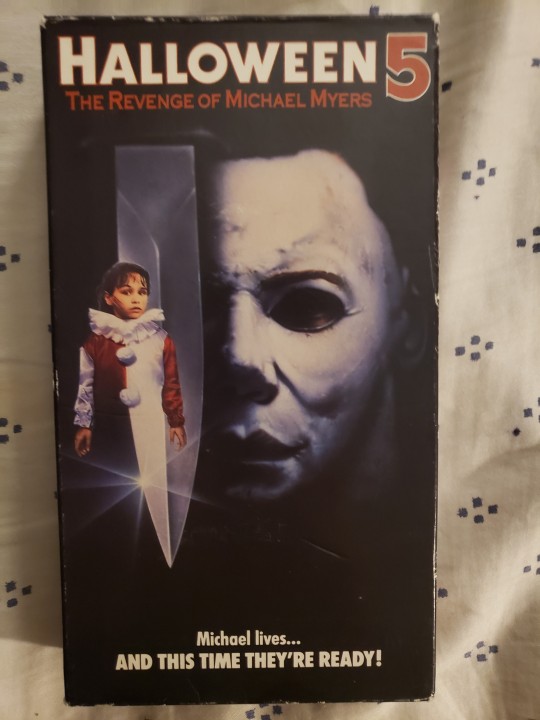
Now showing on DuranDuranTulsa's Horror Show...Halloween 5: The Revenge Of Michael Myers (1989) on glorious vintage VHS 📼! #movie #movies #horror #halloween #Halloween5 #halloween5therevengeofmichaelmyers #johncarpenter #michaelmyers #theshape #DonaldPleasence #ripdonaldpleasance #elliecornell #danielleharris #BeauStarr #donshanks #tamaraglynn Tamara Glynn #wendykaplan #jeffreylandman #matthewwalker #troyevans #JonathanChapin #MaxRobinson #GregNicotero #GeorgePWilbur #vintage #vhs #dominiqueotheningirard #80s #durandurantulsa #durandurantulsashorrorshow
#movies#movie#horror#halloween#halloween 5#halloween 5 the revenge of michael myers#john carpenter#Dominique Othenin Girard#Michael Myers#the shape#donald pleasance#rip donald pleasance#ellie cornell#Danielle Harris#Tamara Glynn#Wendy Kaplan#beau starr#don shanks#Jeffrey Landman#Matthew Walker#troy evans#Jonathan Chapin#max robinson#greg nicotero#George P Wilbur#vintage#vhs#80s#duran duran tulsa's horror show#duran duran tulsa
5 notes
·
View notes
Text
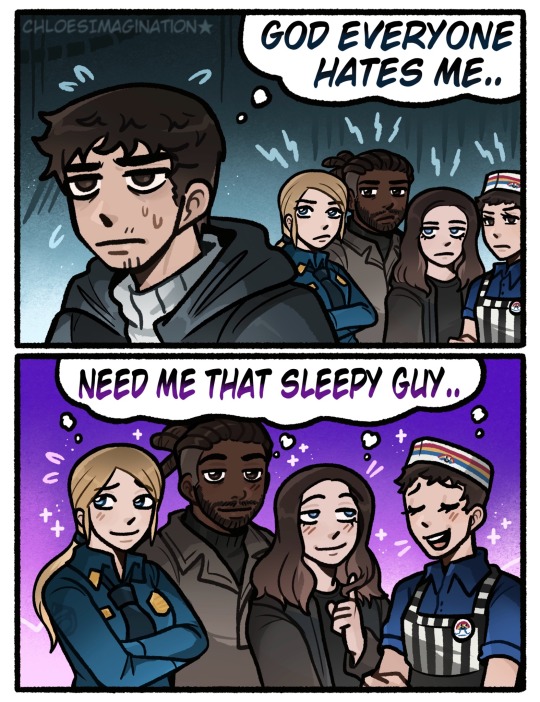
Everyone “hates” Mike in the FNAF movie..
#myart#chloesimagination#comic#fnaf#mike schmidt#fnaf vanessa#vanessa shelly#vanessa afton#jeremiah fnaf#fnaf max#Cindy fnaf#fnaf movie#fnaf fanart#five nights at freddy's#THIS is another unserious comic btw#BUT I JUST find it funny we’re told thru the whole FNAF movie that like#everyone hates Mike he has no friends most people are angry at him#then a good portion of the folks who actually meet Mike#just genuinely like him#or in some cases like Cindy the ice cream girl straight up have a crush on him#Mike has some unspoken rizz to him idk#everyone loves a sleepy guy 🩵#what makes it funnier is Mike doesn’t even pick up at all people like him#that one ‘meet the Robinson’s’ bit#love you Mike Schmidt you’re so funny 💜💜
9K notes
·
View notes
Text
Halloween 5: The Revenge of Michael Myers (1989)
In today's review #DonaldPleasence #DanielleHarris #EllieCornell #BeauStarr #WendyKaplan #TamaraGlynn #JeffreyLandman #DonShanks #JonathanChapin #MatthewWalker #MaxRobinson #BettyCarvalho #TroyEvans #FrankComo #Da
No matter how long it is, you usually have an idea of the ending point when creating a work of fiction. Sequels can complicate this, of course, sequels with changing targets, people coming and going behind the scenes, and the general passage of time complicating the ending as originally written. In 1989, following on from the cliffhanger, the franchise could have gone anywhere, instead, it laid…

View On WordPress
#1989#Beau Starr#Betty Carvalho#Danielle Harris#David Ursin#Don Shanks#Donald Pleasence#Ellie Cornell#film#films#Frank Como#horror#Jeffrey Landman#Jonathan Chapin#Matthew Walker#Max Robinson#Movies#positive#review#Tamara Glynn#Troy Evans#Wendy Kaplan
1 note
·
View note
Text
The one weird monopoly trick that gave us Walmart and Amazon and killed Main Street
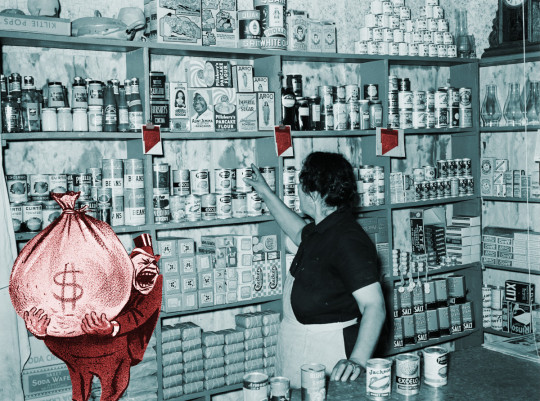
I'm coming to BURNING MAN! On TUESDAY (Aug 27) at 1PM, I'm giving a talk called "DISENSHITTIFY OR DIE!" at PALENQUE NORTE (7&E). On WEDNESDAY (Aug 28) at NOON, I'm doing a "Talking Caterpillar" Q&A at LIMINAL LABS (830&C).

Walmart didn't just happen. The rise of Walmart – and Amazon, its online successor – was the result of a specific policy choice, the decision by the Reagan administration not to enforce a key antitrust law. Walmart may have been founded by Sam Walton, but its success (and the demise of the American Main Street) are down to Reaganomics.
The law that Reagan neutered? The Robinson-Patman Act, a very boring-sounding law that makes it illegal for powerful companies (like Walmart) to demand preferential pricing from their suppliers (farmers, packaged goods makers, meat producers, etc). The idea here is straightforward. A company like Walmart is a powerful buyer (a "monopsonist" – compare with "monopolist," a powerful seller). That means that they can demand deep discounts from suppliers. Smaller stores – the mom and pop store on your Main Street – don't have the clout to demand those discounts. Worse, because those buyers are weak, the sellers – packaged goods companies, agribusiness cartels, Big Meat – can actually charge them more to make up for the losses they're taking in selling below cost to Walmart.
Reagan ordered his antitrust cops to stop enforcing Robinson-Patman, which was a huge giveaway to big business. Of course, that's not how Reagan framed it: He called Robinson-Patman a declaration of "war on low prices," because it prevented big companies from using their buying power to squeeze huge discounts. Reagan's court sorcerers/economists asserted that if Walmart could get goods at lower prices, they would sell goods at lower prices.
Which was true…up to a point. Because preferential discounting (offering better discounts to bigger customers) creates a structural advantage over smaller businesses, it meant that big box stores would eventually eliminate virtually all of their smaller competitors. That's exactly what happened: downtowns withered, suburban big boxes grew. Spending that would have formerly stayed in the community was whisked away to corporate headquarters. These corporate HQs were inevitably located in "onshore-offshore" tax haven states, meaning they were barely taxed at the state level. That left plenty of money in these big companies' coffers to spend on funny accountants who'd help them avoid federal taxes, too. That's another structural advantage the big box stores had over the mom-and-pops: not only did they get their inventory at below-cost discounts, they didn't have to pay tax on the profits, either.
MBA programs actually teach this as a strategy to pursue: they usually refer to Amazon's "flywheel" where lower prices bring in more customers which allows them to demand even lower prices:
https://www.youtube.com/watch?v=BaSwWYemLek
You might have heard about rural and inner-city "food deserts," where all the independent grocery stores have shuttered, leaving behind nothing but dollar stores? These are the direct product of the decision not to enforce Robinson-Patman. Dollar stores target working class neighborhoods with functional, beloved local grocers. They open multiple dollar stores nearby (nearly all the dollar stores you see are owned by one of two conglomerates, no matter what the sign over the door says). They price goods below cost and pay for high levels of staffing, draining business off the community grocery store until it collapses. Then, all the dollar stores except one close and the remaining store fires most of its staff (working at a dollar store is incredibly dangerous, thanks to low staffing levels that make them easy targets for armed robbers). Then, they jack up prices, selling goods in "cheater" sizes that are smaller than the normal retail packaging, and which are only made available to large dollar store conglomerates:
https://pluralistic.net/2023/03/27/walmarts-jackals/#cheater-sizes
Writing in The American Prospect, Max M Miller and Bryce Tuttle1 – a current and a former staffer for FTC Commissioner Alvaro Bedoya – write about the long shadow cast by Reagan's decision to put Robinson-Patman in mothballs:
https://prospect.org/economy/2024-08-13-stopping-excessive-market-power-monopoly/
They tell the story of Robinson-Patman's origins in 1936, when A&P was using preferential discounts to destroy the independent grocery sector and endanger the American food system. A&P didn't just demand preferential discounts from its suppliers; it also charged them a fortune to be displayed on its shelves, an early version of Amazon's $38b/year payola system:
https://pluralistic.net/2022/11/28/enshittification/#relentless-payola
They point out that Robinson-Patman didn't really need to be enacted; America already had an antitrust law that banned this conduct: section 2 of the the Clayton Act, which was passed in 1914. But for decades, the US courts refused to interpret the Clayton Act according to its plain meaning, with judges tying themselves in knots to insist that the law couldn't possibly mean what it said. Robinson-Patman was one of a series of antitrust laws that Congress passed in a bid to explain in words so small even federal judges could understand them that the purpose of American antitrust law was to keep corporations weak:
https://pluralistic.net/2023/04/14/aiming-at-dollars/#not-men
Both the Clayton Act and Robinson-Patman reject the argument that it's OK to let monopolies form and come to dominate critical sectors of the American economy based on the theoretical possibility that this will lead to lower prices. They reject this idea first as a legal matter. We don't let giant corporations victimize small businesses and their suppliers just because that might help someone else.
Beyond this, there's the realpolitik of monopoly. Yes, companies could pass lower costs on to customers, but will they? Look at Amazon: the company takes $0.45-$0.51 out of every dollar that its sellers earn, and requires them to offer their lowest price on Amazon. No one has a 45-51% margin, so every seller jacks up their prices on Amazon, but you don't notice it, because Amazon forces them to jack up prices everywhere else:
https://pluralistic.net/2024/03/01/managerial-discretion/#junk-fees
The Robinson-Patman Act did important work, and its absence led to many of the horribles we're living through today. This week on his Peoples & Things podcast, Lee Vinsel talked with Benjamin Waterhouse about his new book, One Day I’ll Work for Myself: The Dream and Delusion That Conquered America:
https://athenaeum.vt.domains/peoplesandthings/2024/08/12/78-benjamin-c-waterhouse-on-one-day-ill-work-for-myself-the-dream-and-delusion-that-conquered-america/
Towards the end of the discussion, Vinsel and Waterhouse turn to Robinson-Patman, its author, Wright Patman, and the politics of small business in America. They point out – correctly – that Wright Patman was something of a creep, a "Dixiecrat" (southern Democrat) who was either an ideological segregationist or someone who didn't mind supporting segregation irrespective of his beliefs.
That's a valid critique of Wright Patman, but it's got little bearing on the substance and history of the law that bears his name, the Robinson-Patman Act. Vinsel and Waterhouse get into that as well, and while they made some good points that I wholeheartedly agreed with, I fiercely disagree with the conclusion they drew from these points.
Vinsel and Waterhouse point out (again, correctly) that small businesses have a long history of supporting reactionary causes and attacking workers' rights – associations of small businesses, small women-owned business, and small minority-owned businesses were all in on opposition to minimum wages and other key labor causes.
But while this is all true, that doesn't make Robinson-Patman a reactionary law, or bad for workers. The point of protecting small businesses from the predatory practices of large firms is to maintain an American economy where business can't trump workers or government. Large companies are literally ungovernable: they have gigantic war-chests they can spend lobbying governments and corrupting the political process, and concentrated sectors find it comparatively easy to come together to decide on a single lobbying position and then make it reality.
As Vinsel and Waterhouse discuss, US big business has traditionally hated small business. They recount a notorious and telling anaecdote about the editor of the Chamber of Commerce magazine asking his boss if he could include coverage of small businesses, given the many small business owners who belonged to the Chamber, only to be told, "Over my dead body." Why did – why does – big business hate small business so much? Because small businesses wreck the game. If they are included in hearings, notices of inquiry, or just given a vote on what the Chamber of Commerce will lobby for with their membership dollars, they will ask for things that break with the big business lobbying consensus.
That's why we should like small business. Not because small business owners are incapable of being petty tyrants, but because whatever else, they will be petty. They won't be able to hire million-dollar-a-month union-busting law-firms, they won't be able to bribe Congress to pass favorable laws, they can't capture their regulators with juicy offers of sweet jobs after their government service ends.
Vinsel and Waterhouse point out that many large firms emerged during the era in which Robinson-Patman was in force, but that misunderstands the purpose of Robinson-Patman: it wasn't designed to prevent any large businesses from emerging. There are some capital-intensive sectors (say, chip fabrication) where the minimum size for doing anything is pretty damned big.
As Miller and Tuttle write:
The goal of RPA was not to create a permanent Jeffersonian agrarian republic of exclusively small businesses. It was to preserve a diverse economy of big and small businesses. Congress recognized that the needs of communities and people—whether in their role as consumers, business owners, or workers—are varied and diverse. A handful of large chains would never be able to meet all those needs in every community, especially if they are granted pricing power.
The fight against monopoly is only secondarily a fight between small businesses and giant ones. It's foundationally a fight about whether corporations should have so much power that they are too big to fail, too big to jail, and too big to care.

Community voting for SXSW is live! If you wanna hear RIDA QADRI and me talk about how GIG WORKERS can DISENSHITTIFY their jobs with INTEROPERABILITY, VOTE FOR THIS ONE!

If you'd like an essay-formatted version of this post to read or share, here's a link to it on pluralistic.net, my surveillance-free, ad-free, tracker-free blog:
https://pluralistic.net/2024/08/14/the-price-is-wright/#enforcement-priorities
#pluralistic#Robinson-Patman Act#ftc#alvaro bedoya#monopoly#monopsony#main street#too big to jail#too big to care#impunity#regulatory capture#prices#the american prospect#Max M Miller#Bryce Tuttle#a and p#wright patman
2K notes
·
View notes
Text
When we refuse to either distance ourselves from our sex or capitulate to sex role stereotypes, we make room for others to do the same while participating in that resistance ourselves.
Max Robinson, Detransition: beyond before and after, p. 72
1 note
·
View note
Text
WELLLLLLLLL @inyaboy you keep on tellin it and I'mma keep on tellin it - because he got PAID TO NOT TELL IT, even tho we all found out his truth after he was gone
Max Robinson, the nation’s controversial and troubled first black anchorman who was plagued in his final years by professional and personal demons, died Tuesday.
Before his death at age 49 at Howard University Hospital in Washington from the complications of AIDS, his family would not comment on reports that he had the fatal disease. But shortly after his death, United Press International quoted an old family friend, Roger Wilkins, as saying that Robinson’s posthumous wish was that his death be used to emphasize the need for AIDS treatment and education, especially among blacks.
‘Very Difficult Times’
In a Washington Post interview last May, five years after Robinson, Peter Jennings and the late Frank Reynolds formed a famous news troika for ABC, the failing anchorman reflected on the burdens he had long felt as a role model for black youth but refused comment on the alcohol and drug-abuse rumors that had plagued his career.
He had been thought near death in February when he was hospitalized in Chicago and the AIDS reports began to increase. “The curiousity has at times annoyed me,” he said shortly afterward. But he would not comment further, saying only, “I’ve had very difficult times.”
Once the darling of the airwaves, Robinson went from the summit of personal success at a $500,000 a year job to the depths of personal despair.
Married three times and the father of four children, Robinson had grown up in segregated Richmond, son of schoolteacher parents.
All his siblings became successful. A sister, Jewell, is an actress in Washington; his brother, Randall, is a Harvard-trained lawyer and head of the anti-apartheid group Transafrica, and a second sister, Jean, is director of public relations at a school of the arts in Chicago.
It was a snug, loving family, he said, and he was ill-prepared for the prejudice he encountered in his first TV job at a small station in Portsmouth, Va.
Robinson read the news but his face was never seen. One day he asked the cameraman to remove the sign “news” that covered the screen while he was reading and show the face behind the voice. The following day the station owner called and fired him.
“He’d gotten these calls from some irate whites who’d found out that one of ‘those’ people was working there.”
He moved to station WTOP in Washington, D.C., in 1965 as a reporter and, said Edward F. Ryan, a former news director, was “a guy who went after stories and got ‘em.”
“He had great presence on the air,” remembered James Snyder, vice president for news for Post Newsweek Stations, who worked with Robinson at WTOP. “He was a very meticulous dresser. He was a very proud man. He was very meticulous about his on-air performance. He rarely made a mistake. He was very conscious that he was a role model.”
But Snyder and others said Robinson was haunted by private demons. Friends said he labored under enormous pressure both because of his race and his fears of inadequacy.
Professionally he was at a peak he never again achieved, even when he reached the national level. In Washington, he even became part of the news when the Hanafi Muslims took over the B’nai B’rith headquarters in Washington and one of the sect leader’s first calls was to him.
Impressed with his seeming calm under fire, ABC beckoned.
In 1978, Robinson became the nation’s first black television network news star when he was made part of the three-anchor team of ABC’s “World News Tonight.” He was based in Chicago, working with Reynolds in Washington and Jennings in London.
Off camera, he proved himself feisty, complaining to network colleagues and superiors that news stories often did not reflect the black viewpoint.
“I remember someone once saying to me that I wasn’t a team player,” he told the Post in May. “And I said, ‘I’d be happy to play on the team if the rules were not structured against me and my people.’ ”
‘A Very Heavy Burden’
He grew stubborn and some said, arrogant, once showing up for an interview in a chauffeur-driven limousine.
And he sometimes showed up at the station late; sometimes not at all and sometimes drunk.
He made speeches about what he perceived as the racist nature of news coverage, which got him into trouble.
“Professionally, Max carried a very heavy burden for a while,” Jennings said on Tuesday. “He carried it with a lot of dignity. It wasn’t always easy for him.”
Finally, in 1983, the debonair, handsome and regally erect newsman who proffered the evening news as a royal gesture, departed the national scene.
What started the Emmy award winner’s downfall were speeches in which he criticized the media in general and his own network in particular for not assigning black reporters to the inauguration of President Reagan and the Iran hostage crisis. What apparently triggered his ouster was his not showing up for co-anchor Frank Reynolds’ televised funeral in which Robinson was to have been seated next to Nancy Reagan.
After leaving ABC, he became a co-anchor at WMAQ, the NBC-owned station in Chicago and then, in June, 1985, turned himself into a hospital in Cleveland for treatment of depression and alcoholism.
“I think one of my basic flaws,” he said in May, “has been a lack of esteem; not really feeling great about myself, always feeling like I had to do more. I never could do enough or be good enough. . . .
“In fact, it probably was the essential problem I had throughout my career, throughout my life.”

#Black Conscious 💚🖤❤️✊✨
662 notes
·
View notes
Text
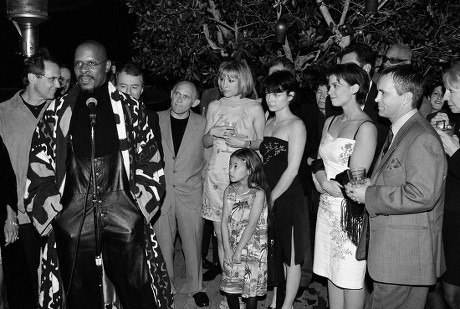



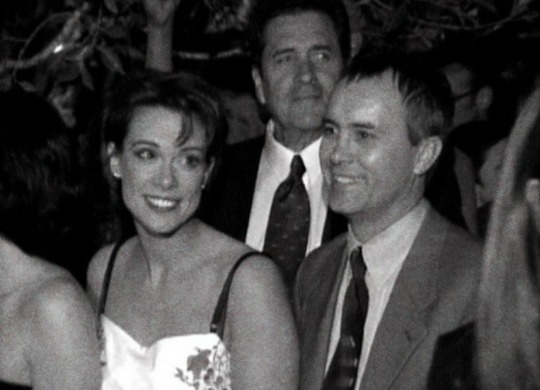
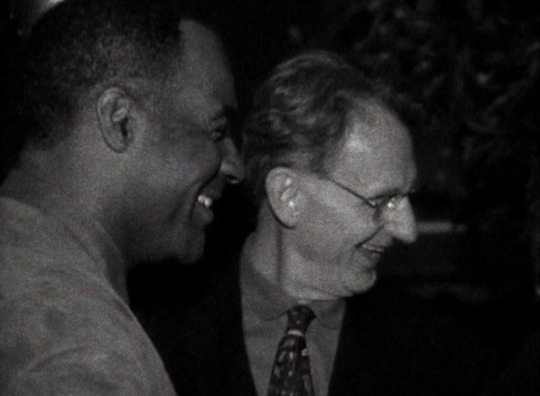
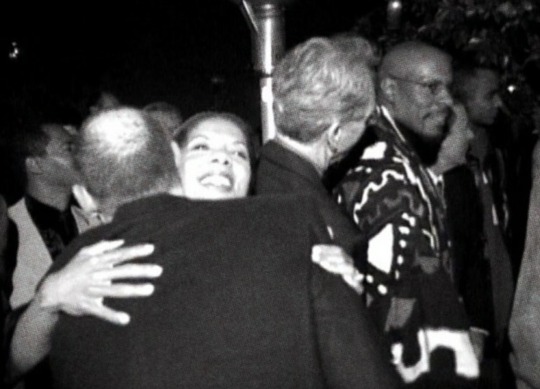


The Star Trek: DS9 Wrap Party, April 1999
#star trek#ds9#star trek ds9#deep space nine#star trek deep space nine#avery brooks#nana visitor#rene auberjonois#terry farrell#alexander siddig#siddig el fadil#cirroc lofton#armin shimerman#chase masterton#michael dorn#max grodenchik#and more!!!#honestly these are so lovely 🥺#the ones of nana and siddig especially are so adorable#and terry farrell is so beautiful!!!#majel barrett#andy robinson
1K notes
·
View notes
Text
























ANDY ROBINSON as Garak in DEEP SPACE NINE, S4.E24 (Body Parts, 1996)
Also starring Armin Shimerman as Quark, Max Grodenchik as Rom.
#andy robinson#andrew robinson#andy my love#garak#elim garak#armin shimerman#quark#max grodenchik#rom#ds9#deep space nine#star trek#sci fi#sci fi series#tv shows#tv series#iconic#current mood#my night posts#at last#this is a good day for my very first star trek post
126 notes
·
View notes
Text

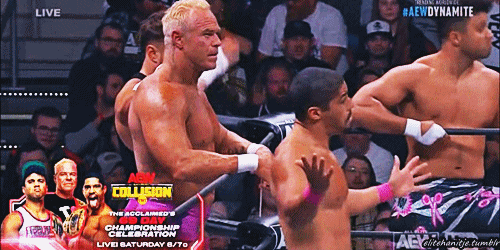
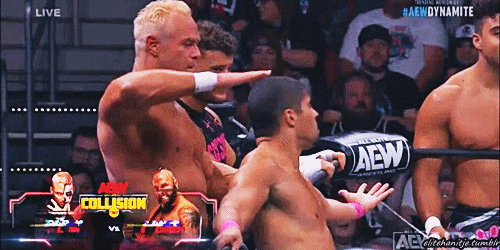


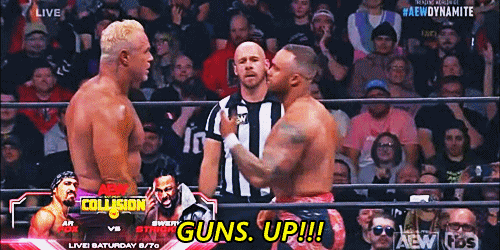

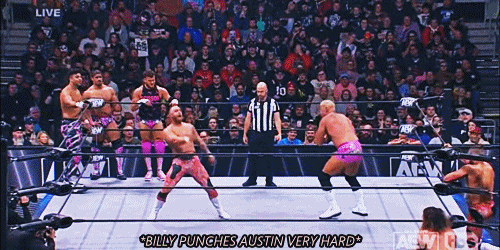
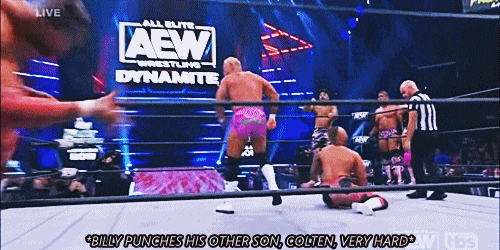

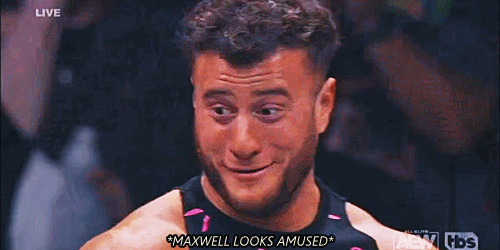


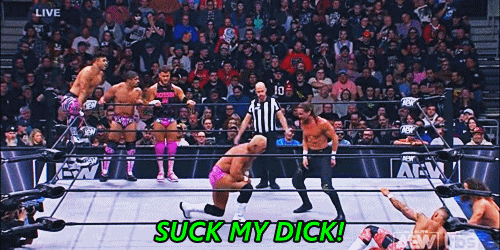
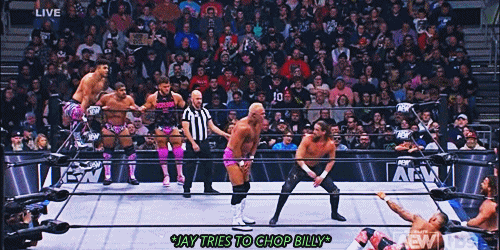

"I've been in the ring with Billy Gunn; he's as massive, powerful, and quick as he looks." - TAZ
#Billy Gunn#Austin Gunn#Colten Gunn#Anthony Bowens#Max Caster#Jay White#Maxwell Jacob Friedman#Juice Robinson#AEW#All Elite Wrestling#The Acclaimed#Bullet Club Gold#MJF#Bang Bang Gang#AEW Dynamite#AEW Rampage#AEW Collision
406 notes
·
View notes
Text

Kicking off my Christmas 🎄 movie marathon with...Silent Night Deadly Night (1984) on glorious vintage VHS 📼! ##movie #movies #horror #Christmas #santaclaus #santaclauskiller #silentnightdeadlynight #robertbrianwilson #lilyanchauvin #riplilyanchauvin #amystyvesant #gilmermccormick #brittleach #toninero #leogeter #nancyborgenicht #tarabuckman #linneaquigley #willhare #jonathanbest #randystumpf #dannywagner #vincemassa #MichaelAlvarez #alexburton #maxbroadhead #donshanks #MaxRobinson #charlesdierkop #vintage #VHS #80s #merrychristmas #merrychristmas2024
#movie#movies#horror#christmas#santa claus#sanya claus killer#silent night deadly night#Robert Brian Wilson#lilyan chauvin#rip lilyan chauvin#toni nero#tara buckman#nancy borgenicht#britt leach#leo geter#will hare#charles dierkop#linnea quigley#gilmer mccormick#vhs#80s#danny wagner#randy stumpf#jonathan best#amy styvesant#max robinson#vince massa#Michael Alvarez#alex burton#max broadhead
1 note
·
View note
